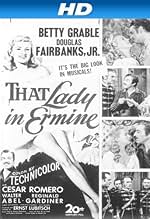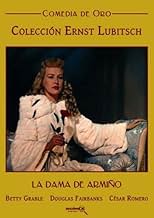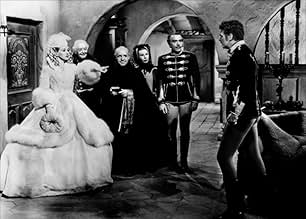That Lady in Ermine tells two parallel stories, both taking place in the small Mittel-European duchy of Bergamo, with one set in the 19th century and the other in the 16th.That Lady in Ermine tells two parallel stories, both taking place in the small Mittel-European duchy of Bergamo, with one set in the 19th century and the other in the 16th.That Lady in Ermine tells two parallel stories, both taking place in the small Mittel-European duchy of Bergamo, with one set in the 19th century and the other in the 16th.
- Directors
- Writers
- Stars
- Nominated for 1 Oscar
- 2 nominations total
Lester Allen
- Jester
- (uncredited)
Mary Bear
- Isabella - Ancestor
- (uncredited)
David Bond
- Gabor
- (uncredited)
Harry Carter
- Staff Officer
- (uncredited)
Harry Cording
- Orlando - Ancestor
- (uncredited)
Herbert Evans
- Ancestor
- (uncredited)
Jack George
- Count Giovanni - Ancestor
- (uncredited)
Don Haggerty
- Staff Officer
- (uncredited)
Joe Haworth
- Soldier
- (uncredited)
Ray Hyke
- Albert's Knight
- (uncredited)
- Directors
- Writers
- All cast & crew
- Production, box office & more at IMDbPro
Featured reviews
In 1948 this was my all-time favorite movie. Betty Grable's costumes were so ravishing that I wanted to grow up to be her and dress like that. Douglas Fairbanks, Jr., was irresistible as the dashing Hungarian officer. Silly and fluffy as this movie might appear at first, when I was eight years old it seemed to me to say something important about relations between men and women. I saw it again the other day; I was surprised to find that it still did.
I really enjoyed this Lubitsch movie with Betty Grable. It made quite a change from her usual "musicals", and I cannot again understand why there have been no videos or DVDs made of it. Younger viewers who don't even know who Betty Grable is will surely appreciate this Lubitsch movie. Here's hoping!
I enjoyed this film far more than anything had led me to anticipate; from reading other comments here, I suspect it benefits enormously from being seen on a full-size screen in the cinema, in the company of a cheerful and enthusiastic audience. I was lucky enough to have that experience, borne up on ripples of laughter from all around, and had an immensely good time with this undemanding comedy.
For it is as a comedy that it shines, if it shines anywhere at all. The music is nothing special -- in fact, I hadn't realised it *was* a musical, and was very surprised when the assembled ancestors burst into half-spoken lyric -- but I do have to admit that the half-threat, half-promise of 'Oh, what I'll do...' has proved far more catchy than it ever seemed at the time, as it's still going round and round in my head!
The plot, such as it is, largely pivots around the past history of the eponymous Francesca, a sixteenth-century portrait sporting a distinctly anachronistic hairstyle and fur-coat. Her idea on the sanctity of marriage don't quite jibe with those of her distant descendant, the Countess Angelina, and one can almost hear the storyline creaking at the seams under the strain of the Production Code in order to ensure that the heroine arrives unsullied in her much-delayed marriage-bed with the right man...
The romance is scarcely earth-shattering, and in fact the first few scenes, played pretty well straight, verge on the tedious. But where script and film really come to life is in the battle of the sexes that follows. The impudence of Douglas Fairbanks Jr's courtship of Betty Grable's married Angelina is equalled only by Betty-Grable-as-Francesca's pursuit of him in turn, culminating in complete role-reversal in the hilarious fantasy sequence where she -- literally -- sweeps him off his feet. This is probably the comic climax of the plot, although the consequences of the Colonel's understandable confusion are worked out with a deft touch in the remaining two 'acts' of the operetta-structure, and the spectacle of Fairbanks' blissful, bemused awakening is more or less worth the price of admission on its own.
Grable is entirely convincing in establishing her two contrasting characters, wisely gets almost all the (limited) singing opportunities, and shares the honours where the swathes of quotable dialogue in the various verbal duels are concerned. But in the field of unspoken reaction she is really outclassed by her male supporting leads; Fairbanks in particular is an absolute treat in a number of wordless sequences whose set-up and humour is worthy of the silent screen.
This film is too uneven in style to be a classic, varying from sparkling repartee to hackneyed tedium. But at its best it is quite honestly very funny indeed, and brought a round of spontaneous applause and laughter across the auditorium at the end as the lights went up. Out of tune with its times, it may have failed to draw contemporary audiences -- but, on this showing, really didn't deserve to be disowned by both Grable and Preminger, the (uncredited) director. This is no masterpiece, but a thoroughly entertaining minor work, and I for one found myself grinning in remembrance all the way home.
For it is as a comedy that it shines, if it shines anywhere at all. The music is nothing special -- in fact, I hadn't realised it *was* a musical, and was very surprised when the assembled ancestors burst into half-spoken lyric -- but I do have to admit that the half-threat, half-promise of 'Oh, what I'll do...' has proved far more catchy than it ever seemed at the time, as it's still going round and round in my head!
The plot, such as it is, largely pivots around the past history of the eponymous Francesca, a sixteenth-century portrait sporting a distinctly anachronistic hairstyle and fur-coat. Her idea on the sanctity of marriage don't quite jibe with those of her distant descendant, the Countess Angelina, and one can almost hear the storyline creaking at the seams under the strain of the Production Code in order to ensure that the heroine arrives unsullied in her much-delayed marriage-bed with the right man...
The romance is scarcely earth-shattering, and in fact the first few scenes, played pretty well straight, verge on the tedious. But where script and film really come to life is in the battle of the sexes that follows. The impudence of Douglas Fairbanks Jr's courtship of Betty Grable's married Angelina is equalled only by Betty-Grable-as-Francesca's pursuit of him in turn, culminating in complete role-reversal in the hilarious fantasy sequence where she -- literally -- sweeps him off his feet. This is probably the comic climax of the plot, although the consequences of the Colonel's understandable confusion are worked out with a deft touch in the remaining two 'acts' of the operetta-structure, and the spectacle of Fairbanks' blissful, bemused awakening is more or less worth the price of admission on its own.
Grable is entirely convincing in establishing her two contrasting characters, wisely gets almost all the (limited) singing opportunities, and shares the honours where the swathes of quotable dialogue in the various verbal duels are concerned. But in the field of unspoken reaction she is really outclassed by her male supporting leads; Fairbanks in particular is an absolute treat in a number of wordless sequences whose set-up and humour is worthy of the silent screen.
This film is too uneven in style to be a classic, varying from sparkling repartee to hackneyed tedium. But at its best it is quite honestly very funny indeed, and brought a round of spontaneous applause and laughter across the auditorium at the end as the lights went up. Out of tune with its times, it may have failed to draw contemporary audiences -- but, on this showing, really didn't deserve to be disowned by both Grable and Preminger, the (uncredited) director. This is no masterpiece, but a thoroughly entertaining minor work, and I for one found myself grinning in remembrance all the way home.
If you have the opportunity to catch this one on TV (It's in American Movie Classic's library, I believe, and doesn't appear to be available on video.) and you're a fan of Ernst Lubitsch, don't expect much evidence of his famous "Touch." Herr Lubitsch died before completing very much of this production and the directing reigns were turned over to Otto Preminger. Apparently the studio felt that an artist whose ancestral origins shared to some degree those of Mr. Lubitsch was the proper person to complete this project. My own impression of the final results makes the passing of the talented Mr. Lubitsch a great misfortune for all concerned. As I watched it on a TV broadcast several years ago I stared in amazement at what seemed an extraordinarily clumsy and heavy-handed attempt to tell what is, essentially, a fairy story for adults. There are definitely elements to enjoy and Betty Grable is, as always, appealingly lovely in Technicolor and has a lively and natural presence as an actress. But Mr. Preminger's reputation, without later critically praised films, such as "Anatomy of a Murder," was not greatly enhanced by the final cut of this film.
Watched 'That Lady in Ermine' as an admirer of both Otto Preminger and Ernst Lubitsch and as a fan of classic-era film. It is hard to go wrong too with performers such as Betty Grable, Douglas Fairbanks Jr and Caesar Romero on their own and just as big a delight seeing those names in the same film and there was an intriguing story and ideas here.
Ideas that could have been executed much better on the whole. 'That Lady in Ermine' is far from a bad film and there is a good deal to like, but it is very uneven, quite strange and doesn't really come together as an overall whole. While the talent and potential are not completely squandered they are nowhere near close to being fulfilled, all have done much better and deserved better.
Starting with the good things, 'That Lady in Ermine' does look great. It is very lavishly produced and shot in beautiful, vibrant Technicolor. The music is pleasant and charming regardless of its lack of memorability. There are elements of the Lubitsch touch, where there is sparkling wit, sophistication and charm and where the film has more energy.
Despite her later considering 'That Lady in Ermine' her least favourite film of her career, Betty Grable is spunky and charming, it is not a typical role for her but her approach to it is distinctively so. Romero and especially Fairbanks are immensely likeable in their roles and Walter Abel, Harry Davenport and Reginald Gardiner entertain in support.
However, the story is both slight, plot-less often, and overly silly, with a lot of ideas not done anywhere near much with and too many elements that don't gel together. The script is uneven, sometimes witty and at other times clunky and the pace is a mix of just fine to dull in other stretches. The final act is somewhat heavy-handed which jars with a good deal of the rest of the film.
As has been said, this was Lubitsch's last film and mostly his but he sadly died of a heart attack aged 55 during filming and the film was completed by Preminger. Some may say that the transition from one to the other was seamless, personally do not agree with this. The two had very different directing styles to each other and approached their films differently, Lubitsch's films were light, sophisticated and witty while Preminger's were heavier and some exploring darker and ahead of the time themes and subjects, both as great and absorbing as each other in their own way. Both styles can be seen here and don't gel together, with Lubitsch's style being more successful in his own distinctive way and far more enthusiastic while Preminger's was heavy-handed and coarse which is where the film is less interesting.
Overall, uneven but oddly interesting and watchable. 5/10 Bethany Cox
Ideas that could have been executed much better on the whole. 'That Lady in Ermine' is far from a bad film and there is a good deal to like, but it is very uneven, quite strange and doesn't really come together as an overall whole. While the talent and potential are not completely squandered they are nowhere near close to being fulfilled, all have done much better and deserved better.
Starting with the good things, 'That Lady in Ermine' does look great. It is very lavishly produced and shot in beautiful, vibrant Technicolor. The music is pleasant and charming regardless of its lack of memorability. There are elements of the Lubitsch touch, where there is sparkling wit, sophistication and charm and where the film has more energy.
Despite her later considering 'That Lady in Ermine' her least favourite film of her career, Betty Grable is spunky and charming, it is not a typical role for her but her approach to it is distinctively so. Romero and especially Fairbanks are immensely likeable in their roles and Walter Abel, Harry Davenport and Reginald Gardiner entertain in support.
However, the story is both slight, plot-less often, and overly silly, with a lot of ideas not done anywhere near much with and too many elements that don't gel together. The script is uneven, sometimes witty and at other times clunky and the pace is a mix of just fine to dull in other stretches. The final act is somewhat heavy-handed which jars with a good deal of the rest of the film.
As has been said, this was Lubitsch's last film and mostly his but he sadly died of a heart attack aged 55 during filming and the film was completed by Preminger. Some may say that the transition from one to the other was seamless, personally do not agree with this. The two had very different directing styles to each other and approached their films differently, Lubitsch's films were light, sophisticated and witty while Preminger's were heavier and some exploring darker and ahead of the time themes and subjects, both as great and absorbing as each other in their own way. Both styles can be seen here and don't gel together, with Lubitsch's style being more successful in his own distinctive way and far more enthusiastic while Preminger's was heavy-handed and coarse which is where the film is less interesting.
Overall, uneven but oddly interesting and watchable. 5/10 Bethany Cox
Did you know
- TriviaIn later years Betty Grable said it was her least favorite of all her movies.
- GoofsIf you watch when the Lady in Ermine is dancing with Colonel Ladislas Karolyi Teglas / The Duke her shoes change from the heels to wedges.
- Quotes
Col. Ladislas Karolyi Teglas: If one is in love, one doesn't need an umbrella.
- ConnectionsFeatured in The Costume Designer (1950)
- SoundtracksOoh! What I'll Do (To That Wild Hungarian)
(uncredited)
Written by Friedrich Hollaender
Lyrics Leo Robin
Sung by Betty Grable and chorus
Danced by Betty Grable and Douglas Fairbanks Jr.
- How long is That Lady in Ermine?Powered by Alexa
Details
- Release date
- Country of origin
- Language
- Also known as
- This Is the Moment
- Filming locations
- Production company
- See more company credits at IMDbPro
Box office
- Budget
- $2,484,000 (estimated)
- Runtime1 hour 29 minutes
- Color
- Aspect ratio
- 1.37 : 1
Contribute to this page
Suggest an edit or add missing content


































